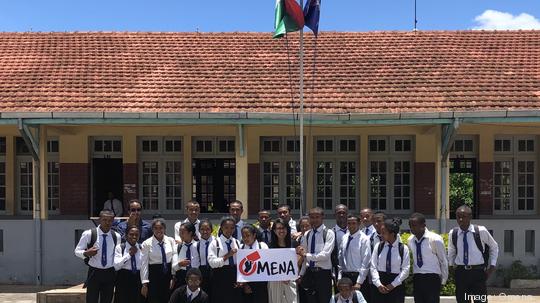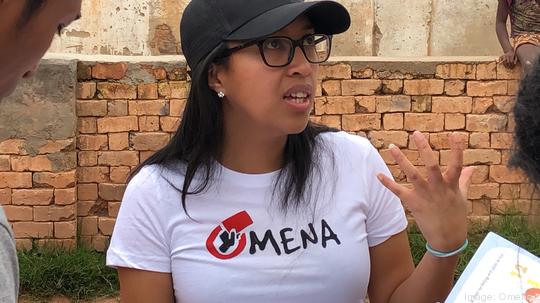
When Francesca Raoelison first came to the U.S. from Madagascar six years ago, the phrase “emotional abuse” was not in her vocabulary.
Through training at community college in Virginia, Raoelison learned about the repeated belittlement, criticism, insult, humiliation, and put-downs that can ultimately lead to an adverse effect on one’s mental health.
Eventually, she came to study at Brown University, where she continued to learn not only about how emotional abuse had impacted her past, but perhaps even more importantly, how to recognize it in the future and spot the red flags associated with it.
Now, Raoelison wants to help others in Madagascar and all over the world recognize emotional abuse. Her nonprofit, Omena, is an educational and advocacy organization that seeks to help people learn about emotional abuse, spot it in their everyday lives, and prevent it going forward.
The organization runs on-the-ground and online workshops and videos that talk about emotional intelligence, body safety and what healthy relationships actually look like.
“I realized that back home in Madagascar, I experienced emotional abuse but that I couldn’t recognize it as emotional abuse at all,” Raoelison told Rhode Island Inno. “From there I could see the link between me, my mental health, my self esteem and how low it was, and how I ended up in very toxic relationships. When people are conditioned to grow up in that type of environment they have a distorted view of what a healthy relationship should look like.”
While going through Brown’s summer startup accelerator, the Breakthrough Lab, Raoelison discovered that as much as 80% of children in Madagascar experience some form of emotional abuse. In response, Raoelison posted a video about some of her experiences in Madagascar on social media, which ended up going viral and launching her nonprofit.

The organization started by going into schools in Madagascar and introducing students ages 6-12 to social and emotional learning. That showed them how to identify, name, and express their emotions in themselves and recognize them in others, which in turn creates empathy. Then members of Omena went into the high schools and talk about what healthy relationships were and what they looked like.
Although these were pilot programs, Omena has been qualitatively measuring the progress by conducting surveys before and after the training sessions.
According to Raoelison, Omena has reached more than 700 students both on the ground and online. Of these students, 99% reported that they had no prior knowledge of emotional abuse.
But after the workshop, all students reported that they could recognize signs of unhealthy and abusive relationships.
Raoelison said the goal is to measure progress by seeing people talk about the dynamics in relationships in their own lives, and if they have seen signs of emotional abuse and what they are doing based on those signs.
“Why people are sometimes very aggressive is because they don't have the tools to express themselves in healthier ways or with empathy,” said Raoelison. “Once people have an understanding of what a healthy relationship should look like they are able to have this sense of urgency with trying to nurture their current relationships and have the hard conversations.”
Prior to the coronavirus pandemic, Omena was piloting programs in 10 schools in Madagascar. But Omena has changed its business model to adapt to the new world by starting to build a large online presence.
Once others saw what Omena had done in Madagascar, people all over the world began reaching out to get involved. Omena began training people worldwide on how to spot emotional abuse and how to teach others to spot it.
Now, Omena has trained roughly 150 peer educators globally in countries including Finland, France, Canada, Rwanda, Peru, China, and India. Raoelison has also given talks in high schools in Providence and at both Harvard and Princeton University.
With that momentum behind the organization, Raoelison is eager to graduate from Brown and begin working on the nonprofit full-time. The goal is to scale by training more peer educators, ideally young people, that can go into schools in their prospective communities and reach more people.
Raoelison also said her goal is to run Omena like a global nonprofit. The organization is thinking of charging a small fee for different training sessions for classroom and workplaces.
She also said Omena is planning to eventually license the model out to other countries once they prove out their case in Madagascar.
Omena has so far won some pitch competitions, but otherwise has not really been active on the fundraising front, an initiative that Raoelison hopes to ramp up in the coming months by first reaching out to friends and family, and then pursuing broader campaigns.
But ultimately, Raoelison says her long-term goal is for Omena to not have to exist, when people have a broader understanding of emotional abuse and how to recognize it. She knows there's a lot of work to do between now and then.
“I do acknowledge that this is a systemic issue and this involves everyone,” she said. “But the way we see it is that the change starts at the individual level and hopefully once we have collective awareness, we will have collective social change and people will be less tolerant of these types of behaviors.”



